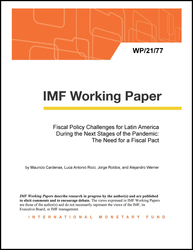
Fiscal Policy Challenges for Latin America during the Next Stages of the Pandemic: The Need for a Fiscal Pact
Fiscal Policy Challenges for Latin America during the Next Stages of the Pandemic: The Need for a Fiscal Pact
READ MORE...
Volume/Issue:
Volume 2021
Issue 077
Publication date: March 2021
ISBN: 9781513574332
$18.00
Add to Cart by clicking price of the language and format you'd like to purchase
Available Languages and Formats
| English |
Prices in red indicate formats that are not yet available but are forthcoming.
Topics covered in this book
This title contains information about the following subjects.
Click on a subject if you would like to see other titles with the same subjects.
Economics- Macroeconomics , Public Finance , Economics / General , International - Economics , fiscal policy , fiscal space , public debt , LAC country , debt ratio , IMF staff calculation , country sample , growth differential , country ability , COVID-19 , Fiscal governance , Global , Caribbean
Summary
The fiscal policy response to the COVID-19 shock in most LAC countries was much larger than during the GFC, suggesting fiscal space was not as tight as expected. We argue that it is feasible and desirable, though not without risks, to embark in a more gradual consolidation path than currently envisaged by several countries in the region. Avoiding an early withdrawal of support in 2021 and 2022 is important given that countries are still facing high rates of contagion and deaths, vaccination will take place very slowly, the economic recovery is partial, uncertain and not strong enough to help those most affected by the twin public health and economic crisis. At the center of this discussion is our conviction that fiscal space is not set in stone and it is endogenous to the medium-term targets and commitments undertaken by governments and congresses throughout the region. Also, revisions to fiscal responsibility frameworks should help anchor fiscal sustainability, as well as improve their effectiveness and flexibility. In this context, low-for-long interest rates and easy market access is generating a situation that, in spite of higher debt levels, interest cost on public debt will remain contained in the foreseeable future. Especially if, as argued in this paper, a more gradual fiscal consolidation path is accompanied with stronger commitments and institutional frameworks that ensure debt is put on a credible downward trajectory once the pandemic is under control. Catalyzing these changes, as well as initiating the debate to design other fiscal reforms to strengthen social protection and increase the progressivity of public finances, would require a broad social consensus and political cohesion around several crucial dimensions of public finances: a fiscal pact. On the other hand, if this agenda is neglected the continuation of low growth, social discontent, and political polarization could drive Latin America towards a very dangerous path of institutional and economic decay.
Copyright © 2010 - 2026
Powered by:
AIDC



